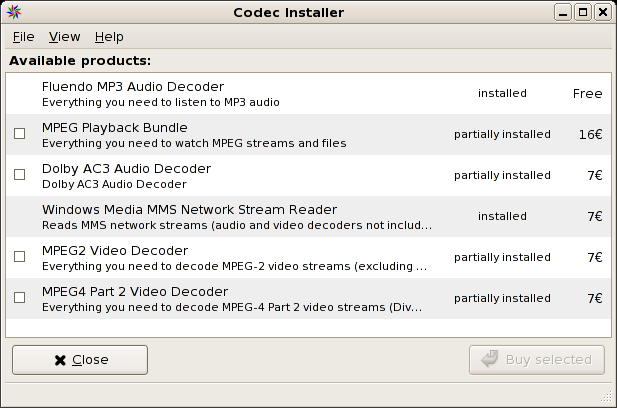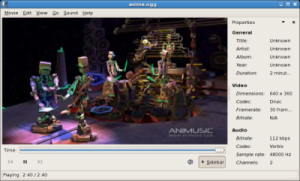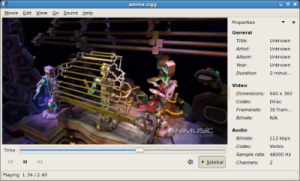Update: These days working at Collabora Multimedia the world leaders in GStreamer consulting.
Category Archives: General
Elisa and Playstation 3 interop
I noticed on the semi official Playstation 3 blog that the upcoming 1.80 firmware will have DLNA support. This is great news as it means you will be able to share and exchange media between your Elisa system and your PS3. Supporting Intel ViiV and DLNA was something I pushed for in Elisa since day one. Thanks to the great work that has been going into Coherence ,the Python uPnP framework we are using, Elisa has very good support for these technologies already and we will of course make sure it will become even better as time goes by.
In regards to Elisa I am also very happy for the
just announced collaboration with the Ubuntu community to create a Ubuntu Media center edition based on Elisa. As I build my own mediacenter solution at home over the next few weeks I will probably try to get involved in that effort myself actually.
Nice review of Elisa
For those who missed it there is a nice review of Elisa over at linux.com today. Especially if you are not very familiar with Elisa it gives a nice overview of the current situation. Also in regard to the much asked question about DVB and PVR support, Elisa superhacker Philippe Normand made the critical mistake of promising me to add support for it as soon as he had a DVB card for his home machine. Well…all I can say is that the card is on the way :)
Jokosher
Michael Sheldon posted a nice screenshot in his latest blog entry about having started on his Google SoC project to add VoIP support to Jokosher. The screenshot
is showing a very good example of how our powerful multimedia architecture is starting to let us easily tie different kinds of applications together in order to provide some really nifty combinations.
Fluendo webshop
I put the Windows Media encoder plugins into the beta program yesterday and expect to put the AAC decoder in today. Hopefully they will be ready for the shop soon along with some updates to the other existing codecs. Also need to check in with Tim the current status of Codeina once he returns from UDS in Seville. Would be great to be able to use Codeina for this set of updates as the webshop software doesn’t exactly make it easy, to put it mildly.

Codeina Screenshot
Planet GStreamer
Last but not least I added Robert McQueen’s blog to Planet GStreamer today. So this means you will be able to follow the latest Collabora, Farsight and Telepathy news also on Planet GStreamer, or at least follow such news when Robert does his once per millenia blog posts :)
Succumbed to latest trend
So after having shunned this social network sites after having had a short run in with Orkut a few years ago I just caved in and signed up for Facebook. I try to defend it to myself by saying its part of what being an early adopter type of persona is all about. Who knows, maybe I get crazy enough soon to install Mugshot even :)
New job opening in the Elisa team
So our Elisa team is growing fast and we are looking to hire one more person. We are primarily looking for someone with good linux and python experience, but knowledge of
OpenGL, DirectFB and GObject is also of interest. We are looking for someone with a European work permit who are interested in re-locating to Barcelona, Spain. As someone who have been living here for a while I can say that it is a wonderful city to live in, with good food and drink, beautiful architecture, great beaches and a fun gang of crazy hackers to work with.
If you are interested in joining our wild and wacky team please send an email with your resume to Lionel Martin, who you can reach at lionel[at]fluendo_dot_com. Non-french speakers are especially encouraged to apply :)
New Schroedinger release out
So David Schleef is kicking ass currently and our Dirac implementation, Schrodinger, is moving quickly forward these days. I just cut a new development releases of both Schroedinger and libtsmux so be sure to check them out.
The plan is to try to make much more frequent releases from here out as things are coming together fast now and the package is at least generally useful for testing.
Be aware that the weakest link in the package is currently the encoder, but this is also what David is focusing on at the moment so expect to see big strides forward in the next few weeks and months in terms of quality of encoded video. Could be we need to tweak the encoder setting further also, although David tried add some sensible defaults for this release.
Here is a couple of screenhots of Totem in action playing a movie I transcoded from a HD Quicktime clip.
The pipeline used to create this movie was:
gst-launch-0.10 filesrc location=animusic2dvd_m720p.mov ! decodebin2 name="decode" decode. ! ffmpegcolorspace ! videoscale method=1 ! "video/x-raw-yuv, width=(int)640, height=(int)360" ! ffmpegcolorspace ! schroenc ! queue ! oggmux name=mux ! gnomevfssink location=file:///tmp/anime.ogg decode. ! audioconvert ! vorbisenc ! queue ! mux.
On Sawfish, Metacity and Linus
Managed to get myself embroiled in a little email exchange with Linus about configurability options and GNOME. Seesm that little exchange even managed to hit Slashdot.
The misconception that I feel Linus have and a lot of the people posting on Slashdot is that patches that adds configuration options to GNOME would automatically get rejected. This is simply false.
At best this is an extrapolation of the quite strict policy of Metacity in particular and the general GNOME policy of ‘no GUI options before thinking’. This policy did come into effect with GNOME 2.x and it came about both due to UI design usability discussions, but also as a result of seeing our config menu’s get clogged with options which mostly where there due to bugs, missing features and a heterogen deployment environment below GNOME. It was decided to focus on actually trying to solve these lower level issues instead of offering config options to work around them. A talk by Jim Getty’s at GUADEC called ‘Draining the swamp’ being considered the call to arms on that issue. Projects such as HAL, the rejuvenated X.org effort and many other freedesktop projects came about almost as a direct consequence of this.
There was also some misconceptions on the Sawfish to Metacity switch that happened in this time period. It is not correct to say that Sawfish got replaced by Metacity due to it being deciding its high degree of configurability was bad, far from it. Sure there
where people who felt Sawfish went a bit overboard in that regard, but that was not the reason it got ditched as the default GNOME window manager. The reason for that was simply that after Eazel went backrupt and Sawfish maintainer John Harper had to find a new job, he ended up at Apple. And thus due to Apple corporate policy, and probably long hours at work, he couldn’t maintain Sawfish anymore. The troublesome thing about Sawfish was that it was written in its own Lisp dialect so as part of Sawfish you got both an extra lisp interpreter and GTK+ bindings for it. This meant that the C/C++ skills in the GNOME community didn’t lend themselves well to fixing bugs in Sawfish.
The two libraries and Sawsfish itself thus went unmaintained as John went away and nobody where interested/felt qualified to take it over. Thus the GNOME developers had to look around for a new window manager and it was decided that one should aim for one written in C like the rest of the desktop libraries to lessen the chance of future maintenance prolems. To answer this call Havoc Pennington stepped up with Metacity and it was quickly adopted by a lot of GNOME developers and users and subsequently chosen as the standard.
Metacity was philosophically very different from Sawfish and Havoc
was very strict about what he let into Metacity, due to an idea that requests for config options was usually a result of broken behaviour in the window manager and thus feeling the behaviour should be fixed instead of a config option added to work around the problem.
This was in line with the policy that do govern GNOME as mentioned above, but in the case of Metacity this was applied in a much sterner/hardcore fashion that for most other modules.
But due to Havoc’s high profile in the community and beyond it I think the policy he kept for metacity colored how people outside the project perceivedthe project as a whole which is the main reason I see for this hard killed perception to live on.
Anyway, back to Linus and his irritation with Metacity. I can’t not say if his patches will go in or not, its not my call. But I did at least add them properly to bugzilla for Linus to ensure they get reviewed and commented on at least.
A cool video blogging idea
A bunch of us from Fluendo where out yesterday at a local bar with Internet access. As such things go we started playing a bit with our Nokia 800’s and the video conferencing feature. What suddenly struck me is that it would be great to have a small application which connects to a googletalk account and just listens for incoming talks. You should then be able to call this account and the application will just accept the inncoming talk and then record it to disk, by muxing it into a container format and maybe transcoding it to Theora/Vorbis. That way you have a easy way to record little video blogs as you travel around and store these on your home computer. The next step then of course would be some kind of youtube extension that let you upload the video clips automatically to youtube or something like that :)
Just proposed the application to the Make it with Mono competition that Miguel blogged about recently. Hopefully it will make it through the moderation so I can try plugging it when the voting starts in April. Should be fairly easy to build this on top of GStreamer and Telepathy (which are also used in the Nokia 800)
Dirac encoder/decoder coming along nicely
So we have been working on the Schroedinger Dirac implementation for some time now and its starting to come together now.
The decoder is pretty fast and works well and the encoder is getting quite close too although its default settings needs to be moved away from developer settings. Not exactly sure where we stand in terms of being compliant with the latest Dirac specification, but we should be quite close as most of Dave’s commits recently have been about taking us the last few steps towards compliance. Anyway here is a screenshot I took today which is showing a video I created using this pipeline:
gst-launch-0.10 filesrc location=Dolphins_1080.wmv ! decodebin2 name="decode" decode. ! ffmpegcolorspace ! videoscale method=1 qos=false ! "video/x-raw-yuv, width=(int)640, height=(int)480" ! ffmpegcolorspace ! schroenc ! queue ! oggmux name=mux ! gnomevfssink location=file:///tmp/dolphins.ogg decode. ! audioconvert ! vorbisenc ! queue ! mux.
Two things stands out in this screenshot, one is that we need the Dirac plugins to report their codec and bitrate to the GUI :) The second is that the encoder needs tweaking so we don’t get the blur shadow at the ‘borders’ between different items in the image.
Interviewed on The Linux Link Tech Show
Ok, so I was interviewed about our recent plugin show on the The Linux Link Tech Show. So if you are interested in hearing what Dan and Patrick managed to lure out of me then go to their page and download Episode 176. Topics include our new codecs, free codecs, DRM and other things we do at Fluendo. The sound, especially on my part being recorded with my on my cell phone and the output of that transcoded at least once if not twice. But hopefully I am interpretable :)
New release of Elisa out
The Elisa team did a new release yesterday, 0.1.3. The big news in this release is initial support for being a upnp server. We have some support for being a upnp client for a long while, but thanks to Coherence we are now able to support being a server also. Be sure to grab this release and report back and issues to the Elisa team. Full release notes for Elisa 0.1.3 to be found here on the Elisa homepage.


